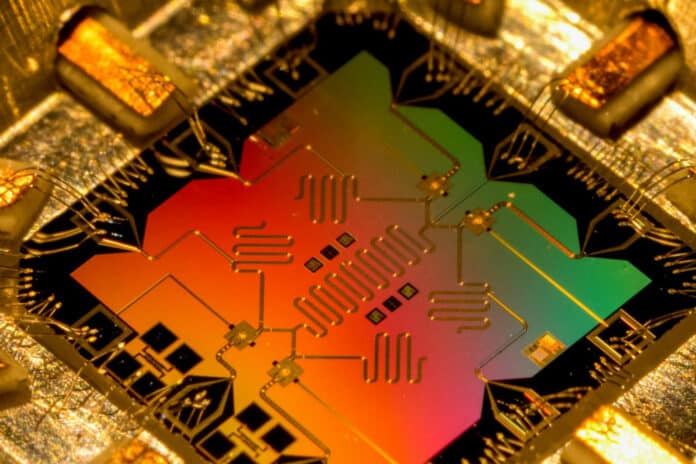System scalability is being sought across various hardware platforms and is essential for large-scale quantum computers (QCs). Architectures like the quantum charge-coupled device (QCCD) are used to grow the number of qubits on a single device for QCs based on trapped ions. However, the size of the chip being used restricts the number of ions that may be accommodated on a single quantum computing module. As a result, a modular approach is crucial and necessitates quantum links between different components.
For the first time, researchers from the University of Sussex and Universal Quantum have successfully and quickly shown that quantum bits (qubits) may be transferred directly across quantum computer microchips. This innovation tackles a significant barrier in building quantum computers that are large and powerful enough to handle challenging issues of vital importance to society.
In this study, researchers used a new and powerful technique called UQ Connect to use electric field links to enable qubits to move from one quantum computing microchip module to another with unprecedented speed and precision. As a result, chips can be assembled like jigsaw puzzle pieces to create a more powerful quantum computer.
The researchers transported the qubits with a 99.999993% success rate and a connection rate of 2424/s. Both numbers are world records and orders of magnitude better than previous solutions.
Professor Winfried Hensinger, Professor of Quantum Technologies at the University of Sussex and Chief Scientist and Co-founder at Universal Quantum, said, “While linking the modules at world-record speed, we also verified that the “strange” quantum nature of the qubit remains untouched during transport, for example, that the qubit can be both 0 and 1 at the same time.”
Dr. Sebastian Weidt, CEO and Co-founder of Universal Quantum and Senior Lecturer in Quantum Technologies at the University of Sussex, said, “Our relentless focus is on providing people with a tool that will enable them to revolutionize their field of work. The Universal Quantum and University of Sussex teams have done something truly incredible here that will help make our vision a reality. These exciting results show the remarkable potential of Universal Quantum’s quantum computers to become powerful enough to unlock the many life-changing applications of quantum computing.”
Dr. Mariam Akhtar led the research as a Research Fellow at the University of Sussex and Quantum Advisor at Universal Quantum. She said, “The team has demonstrated fast and coherent ion transfer using quantum matter links. This experiment validates the unique architecture that Universal Quantum has been developing—providing an exciting route towards truly large-scale quantum computing.”
Professor Sasha Roseneil, Vice-Chancellor of the University of Sussex, said, “It’s fantastic to see that the inspired work of the University of Sussex and Universal Quantum physicists has resulted in this phenomenal breakthrough, taking us a significant step closer to a quantum computer that will be of real societal use.”
“These computers are set to have boundless applications—from improving the development of medicines, creating new materials, to maybe even unlocking solutions to the climate crisis. The University of Sussex is investing significantly in quantum computing to support our bold ambition to host the world’s most powerful quantum computers and create change that has the potential to impact so many people across the world positively.”
“And with teams spanning the spectrum of quantum computing and technology research, the University of Sussex has both a breadth and a depth of expertise. We are still growing our research and teaching in this area, with plans for new teaching programs and appointments.”
Professor Keith Jones, Interim Provost and Pro-Vice-Chancellor for Research and Enterprise at the University of Sussex said, “This is a fascinating finding from our University of Sussex physicists and Universal Quantum. It proves the value and dynamism of the this University of Sussex spin-out company, whose work is grounded in rigorous and world-leading academic research. Quantum computers will be pivotal in helping to solve some of the most pressing global issues.”
Journal Reference:
- M. Akhtar et al., A high-fidelity quantum matter-link between ion-trap microchip modules, Nature Communications (2023). DOI: 10.1038/s41467-022-35285-3
